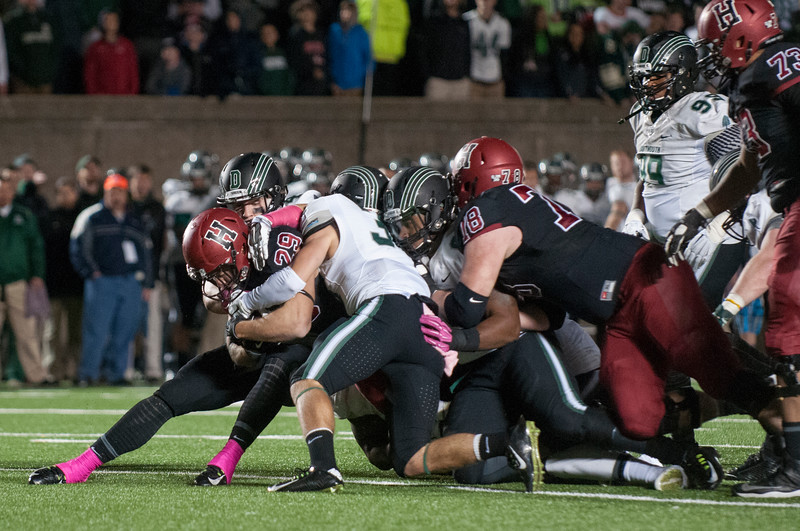
News
Cambridge Residents Slam Council Proposal to Delay Bike Lane Construction

News
‘Gender-Affirming Slay Fest’: Harvard College QSA Hosts Annual Queer Prom

News
‘Not Being Nerds’: Harvard Students Dance to Tinashe at Yardfest

News
Wrongful Death Trial Against CAMHS Employee Over 2015 Student Suicide To Begin Tuesday

News
Cornel West, Harvard Affiliates Call for University to Divest from ‘Israeli Apartheid’ at Rally
One For the Ages in Harvard, Dartmouth Ivy Battle

There are times, especially on cold Friday nights, when the whole exercise of football feels insignificant.
Sitting in the stands, you may feel that you are watching an elaborate children’s game: tin soldiers lined up in formation, exaggerated hand gestures, whispered instructions, and artificial heartbreak.
The real world is full of war and worry; it deserves your emotional attention. But football is a sport, and sometimes you wonder why so many people fill the stands—giving up three hours of free time, braving frozen toes, and neglecting bathroom needs—to watch two groups bicker about moving a ball from one side of the field to another.
Yes, football can feel foolish at times—but Friday night was not one of them.
When Harvard and Dartmouth took the field last weekend, there were exactly two guarantees: that for half the players in the stadium, the night would end in elation, and for the other half, the night would end in devastation.
If this projection seems extreme, then consider the facts.
Ever since the Crimson sobered up from its champagne-soaked victory over Yale last year, the team had prepared to play the Big Green.
Dartmouth menaced as the embittered avenger, the team that filled up seven of the 14 spots on the Preseason All-Ivy Defense but still saw itself as a slighted underdog.
For days and weeks and months, Harvard players trained with this opponent in mind. They woke up for morning workouts, grunted through non-contact drills, and stayed on campus for summer training. And the seniors on the team—well, they did all this with the knowledge that this season would be their last one.
Meanwhile, 130 miles away in Hanover, N.H., the Big Green underwent the same self-sacrifice, and probably with higher stakes.
The Crimson, a perennial older brother, had won 11 straight matchups heading into 2015, including a 23-12 decision last year to hang Dartmouth its only loss. For the senior-heavy Big Green, last weekend’s clash loomed as the final chance to ensure that years of effort had amounted to something more than just another second-place trophy.
On Friday night, football mattered because the adult memories of so many players hinged on the result, and this statement held true before the game even began.
Very rarely does a sporting contest mean as much as this one did.
At the time, you could see this importance in the way that players acted when they were removed from the action—in those quiet moments when muscle memory has no effect, and real emotions emerge in the open.
Witness senior wide receiver Seitu Smith tearing off his helmet after scoring Harvard’s first touchdown of the night. The super-senior poses on the sidelines. He lets teammates pound his chest and listens to the crowd roar.
A few minutes later, witness fellow senior wide receiver Andrew Fischer, also with his helmet off. In this case, though, Fischer is off the field for good: he’s pulled up limp after a long kickoff return, and when the team huddles up for a timeout, he remains near the edge of the crowd, separated from the offensive starters that he’s played with all season.
A few minutes later, witness senior defensive back Asante Gibson dropping an interception and storming to the bench. He throws his helmet on the ground and refuses consolation.
A few minutes later, witness captain Matt Koran pacing up and down the sideline. Harvard has the ball now, but the team still needs a score on Dartmouth to take the lead. With the offense on the field, Koran can do nothing except watch and walk.
A few minutes later, witness freshman wide receiver Justice Shelton-Mosley holding the ball in the end zone. It’s a tie game, 13-13, but the freshman has no celebration planned. Instead, he stands still as his teammates rush around him.
A few minutes later, witness the entire Crimson bench rushing onto the field only to turn back when the referees rule that a second remains on the clock. There’s a lot of shouting at first, but the noise gives way to silence.
Finally, at the end, witness the blocked field-goal attempt rolling out of bounds and Harvard sprinting across the field. Some Big Green players crumple up, but Crimson numbers are everywhere—bumping into each other, jumping up and down, and racing to the locker room.
Witnessing emotions as real as these is a rare treat. That childish thrill, that rush-the-field excitement: these are not experiences that you can find in the domain of everyday life.
As flimsy and frivolous as sports can seem, they also have a special power to deliver gut emotions. If you were there, at Harvard Stadium last Friday night, you felt a rush. And that rush remains.
Staff writer Sam Danello can be reached at sdanello@thecrimson.com.
Want to keep up with breaking news? Subscribe to our email newsletter.
